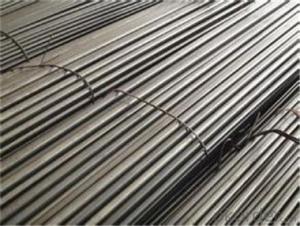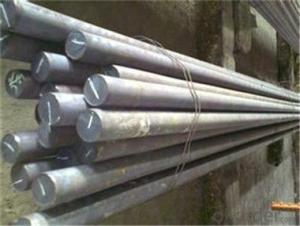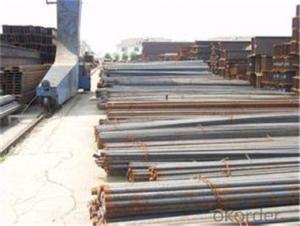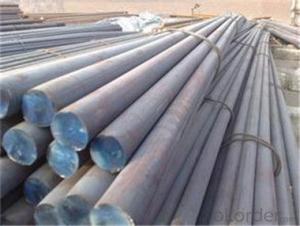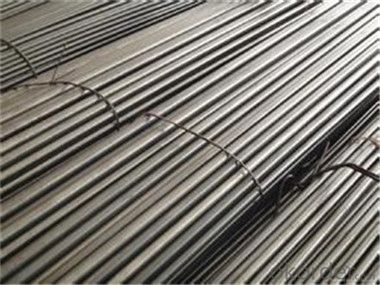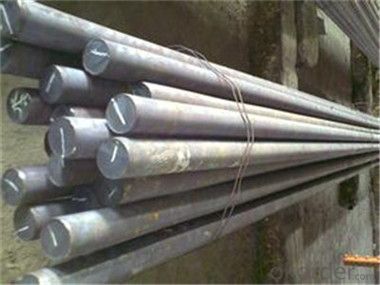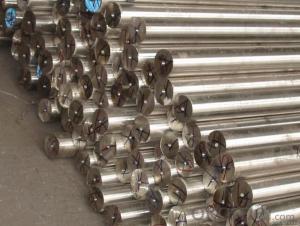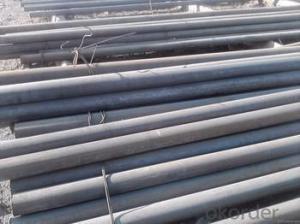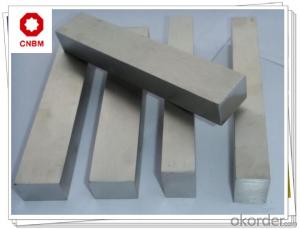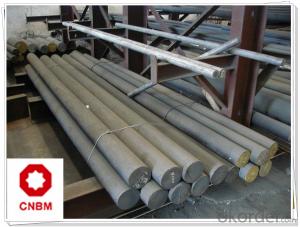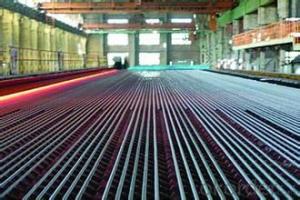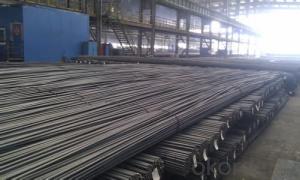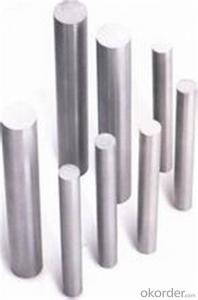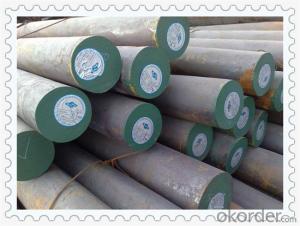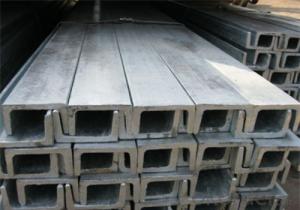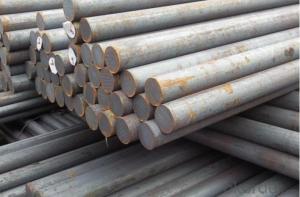A36 Steel Round Bars from China with High Quality
- Loading Port:
- Shanghai
- Payment Terms:
- TT OR LC
- Min Order Qty:
- 500 m.t.
- Supply Capability:
- 2000000 m.t./month
OKorder Service Pledge
OKorder Financial Service
You Might Also Like
Description of steel round bar:
1.Diameter 80 to 800 mm
2.Black or Bright surface
3.Annealed or Quenched and tempered provided
4.Cutting service provide. Carbon steel rod applies to chemical industry, shipping industry,
manufacturing industry,construction,decorate Industry,electric power,
pump shafts, sanitary wares,furniture handles,boiler,high temperature
resistant,low temperature resistant, corrosion resistant.
Festures of steel round bar:
4340 Forged Round Steel Bar
1.Dia 80-800mm Length:2000-13000mm or as required
2.Technique:Forged
3.Delivery Time:45 days
Specifications of steel round bar:
1. Standards: AISI 4340 8620 8640 4320 , JIS SNCM8 GB:40CrNiMoA
2. Specification: Dia: 80~450mm Length:2000-13000mm or as required
Images of steel round bar:
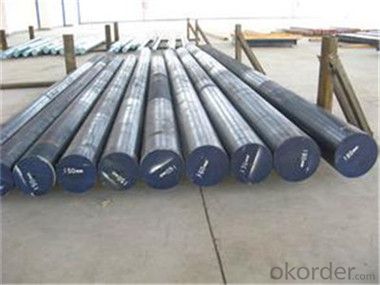
FAQ:
1. What is your package?
Packing situation: standard seaworthy packing or as customer required.
2. How long is the lead time?
Delivery time: 45 days after order confirmed.
3. What payment term do you accept?
Payment: T/T or L/C at sight.
- Q: Are steel round bars corrosion resistant?
- No, steel round bars are not inherently corrosion resistant. Steel is primarily made of iron, and iron is prone to rusting when exposed to moisture and oxygen. However, there are certain types of steel that are specifically designed to be corrosion resistant. These types of steel, such as stainless steel, contain additional alloying elements like chromium and nickel, which form a protective layer on the surface of the steel, preventing rust and corrosion. So, while regular steel round bars are not corrosion resistant, there are corrosion-resistant options available in the form of stainless steel round bars.
- Q: What are the advantages of using nickel-molybdenum-vanadium alloy steel round bars?
- One advantage of using nickel-molybdenum-vanadium alloy steel round bars is their high strength and toughness. This makes them suitable for applications that require resistance to heavy loads and impact. Additionally, these alloy steel round bars have excellent corrosion resistance properties, making them ideal for use in environments with high humidity or exposure to chemicals. Furthermore, the addition of nickel, molybdenum, and vanadium enhances the material's heat resistance, making it suitable for high-temperature applications.
- Q: What is the tensile strength of round steel bars of diameter 28?
- The maximum tensile strength of material resistance uniform plastic deformation, tensile specimens before under maximum tensile stress, the deformation is uniform, but beyond the metal after the necking phenomenon began to appear, which produce concentrated deformation; for no (or very small) brittle materials with uniform plastic deformation, it reflects the fault the resistance of the material. The symbol is Rm (GB/T 228-1987, the old GB standard, the tensile strength symbol is b), the unit is MPa.
- Q: What are the different shapes available in steel round bars?
- Steel round bars are available in a variety of shapes, each designed to meet specific needs and applications. Some of the common shapes of steel round bars include: 1. Round: This is the most common and basic shape of steel round bars. It has a circular cross-section and is widely used in various industries for applications such as construction, manufacturing, and engineering. 2. Square: Square steel round bars have a square cross-section, making them suitable for applications that require stability and structural strength. They are commonly used in the construction of frames, supports, and braces. 3. Hexagonal: Hexagonal steel round bars have six flat sides and are often used in applications that require better grip and torque resistance, such as in machinery and tools. The hexagonal shape allows for a more secure connection and prevents slippage. 4. Flat: Flat steel round bars have a rectangular cross-section with two flat sides. They are commonly used for structural applications, such as in building frames and supports, as well as in the manufacturing of machinery and equipment. 5. Half-round: Half-round steel round bars have a semi-circular cross-section with one flat side. They are often used as decorative elements in architecture and furniture, as well as in the construction of railings and handles. 6. Oval: Oval steel round bars have an elongated oval shape, providing a unique aesthetic appeal. They are commonly used in decorative applications, such as in the design of furniture, railings, and artistic structures. Overall, the availability of different shapes in steel round bars allows for versatility in various industries, enabling engineers, manufacturers, and designers to choose the most suitable shape based on their specific requirements.
- Q: Can steel round bars be used for making exercise equipment?
- Yes, steel round bars can be used for making exercise equipment. Steel round bars are known for their durability and strength, making them suitable for constructing various types of exercise equipment. They can be used to create weightlifting bars, dumbbells, barbells, and other fitness equipment that require sturdy and reliable materials. Additionally, steel round bars can be easily machined, welded, and shaped into different forms, allowing for customization and versatility in exercise equipment design. The use of steel round bars ensures that the exercise equipment can withstand heavy loads and provide stability during workouts, making them a popular choice among gym equipment manufacturers and fitness enthusiasts.
- Q: How do steel round bars compare to stainless steel round bars?
- Steel round bars and stainless steel round bars have some key differences that make them suitable for different applications. One of the main differences between steel and stainless steel round bars is their composition. Steel is primarily made of iron, with small amounts of carbon and other elements. Stainless steel, on the other hand, is an alloy composed of iron, chromium, and often other elements like nickel or molybdenum. This composition gives stainless steel its unique properties, such as corrosion resistance. In terms of strength, both steel and stainless steel round bars can be manufactured to have high tensile strength. However, stainless steel generally has higher tensile strength compared to regular steel, making it more suitable for applications that require additional strength and durability. Another important difference is their resistance to corrosion. Stainless steel round bars have excellent corrosion resistance due to the presence of chromium in their composition. This makes them ideal for applications where they will be exposed to moisture, chemicals, or other corrosive environments. Steel round bars, on the other hand, are more susceptible to rust and corrosion and may require additional protective coatings in such environments. In terms of cost, steel round bars are generally more affordable compared to stainless steel round bars. The higher cost of stainless steel is due to its unique properties and the additional alloying elements required in its production. Both steel and stainless steel round bars have their own advantages and applications. Steel round bars are commonly used in construction, manufacturing, and general-purpose applications where corrosion resistance is not a primary concern. Stainless steel round bars, on the other hand, find extensive use in industries such as food processing, chemical processing, medical equipment, and marine applications, where corrosion resistance is crucial. In summary, the choice between steel round bars and stainless steel round bars depends on the specific requirements of the application. Steel round bars are more affordable but may require additional corrosion protection, while stainless steel round bars offer superior corrosion resistance and strength.
- Q: How do you prevent rusting of steel round bars?
- To prevent rusting of steel round bars, there are several effective measures that can be taken: 1. Apply a protective coating: One of the most common ways to prevent rusting is by applying a protective coating on the steel round bars. This can be done by using paint, varnish, or a specialized rust-preventive coating. The coating acts as a barrier between the steel surface and the surrounding environment, preventing moisture and oxygen from reaching the metal and causing rust. 2. Keep the steel dry: Moisture is a key factor that contributes to the corrosion of steel. Therefore, it is crucial to keep the steel round bars as dry as possible. This can be achieved by storing them in a dry environment or using dehumidifiers in areas where moisture levels are high. 3. Maintain proper ventilation: Adequate ventilation helps in preventing the accumulation of moisture around the steel round bars. Good air circulation allows any moisture that may be present to evaporate, reducing the risk of rust formation. 4. Implement a rust inhibitor: Rust inhibitors, also known as corrosion inhibitors, can be applied to the steel round bars to prevent rust formation. These inhibitors work by chemically reacting with the metal surface, forming a protective layer that inhibits the oxidation process. Rust inhibitors can be in the form of oils, waxes, or specialized compounds. 5. Store in a controlled environment: If the steel round bars are not immediately being used, it is essential to store them in a controlled environment. This typically means keeping them in a dry, temperature-controlled area to minimize exposure to moisture and extreme temperatures, both of which can accelerate rust formation. 6. Regular maintenance and inspection: It is advisable to regularly inspect the steel round bars for signs of rust or damage. If any rust spots are detected, they should be promptly cleaned and treated with a rust remover or inhibitor to prevent further corrosion. By following these preventive measures, the rusting of steel round bars can be significantly reduced, ensuring their longevity and maintaining their structural integrity.
- Q: Can steel round bars be used in the production of electrical equipment?
- Yes, steel round bars can be used in the production of electrical equipment. Steel is a versatile material with various properties that make it suitable for different applications, including electrical equipment. Steel round bars can be used to manufacture components such as shafts, connectors, and structural supports in electrical equipment. The strength and durability of steel make it a reliable choice for these applications, as it can withstand the mechanical stresses and environmental conditions that electrical equipment may be exposed to. Additionally, steel can provide good electrical conductivity and magnetic properties, which are important characteristics for certain electrical components. However, it is worth noting that steel round bars may need to undergo additional processes such as machining, heat treatment, or surface finishing to meet specific requirements for electrical equipment production.
- Q: Can steel round bars be used in the hydraulic industry?
- Certainly, the hydraulic industry can make use of steel round bars. Renowned for their robustness, endurance, and immunity to corrosion, steel round bars prove to be ideal for a wide range of applications within the hydraulic industry. They find utility in the production of hydraulic cylinders, pistons, and other components necessitating exceptional tensile strength and dependability. Moreover, steel round bars can be conveniently machined and fashioned into diverse dimensions and specifications, ensuring they align with the precise requirements of hydraulic systems. In essence, owing to their exceptional mechanical characteristics and adaptability, steel round bars remain a favored choice in the hydraulic industry.
- Q: What are the different types of steel round bars used in the manufacturing of cutting tools?
- In the manufacturing of cutting tools, there are various types of steel round bars commonly used. These include: 1. High-Speed Steel (HSS): HSS round bars possess exceptional hardness, wear resistance, and the ability to maintain a sharp cutting edge even at high temperatures. They find extensive use in metalworking and high-speed applications for the production of drills, end mills, and other cutting tools. 2. Tool Steel: Tool steel round bars are widely utilized in cutting tool production due to their high strength, toughness, and resistance to wear and deformation. Different grades of tool steel, such as D2, A2, and O1, are selected based on the specific requirements and applications of the cutting tool. 3. Carbon Steel: Cutting tools designed for softer materials like wood and plastics often incorporate carbon steel round bars. Carbon steel offers satisfactory hardness and durability, making it suitable for a wide range of cutting applications. 4. Stainless Steel: Cutting tools requiring superior corrosion resistance and strength often employ stainless steel round bars. Stainless steel provides good durability, toughness, and edge retention, making it a popular choice in industries such as food, medicine, and other cleanliness-sensitive applications. 5. Alloy Steel: The production of alloy steel round bars involves the addition of various alloying elements like chromium, molybdenum, and vanadium to enhance its properties. Alloy steel exhibits improved hardness, strength, and wear resistance, making it suitable for demanding cutting applications like machining hardened materials and high-temperature cutting. Choosing the appropriate type of steel round bar for a cutting tool is crucial and depends on specific requirements such as the material being cut, desired cutting speed, and expected operating conditions.
Send your message to us
A36 Steel Round Bars from China with High Quality
- Loading Port:
- Shanghai
- Payment Terms:
- TT OR LC
- Min Order Qty:
- 500 m.t.
- Supply Capability:
- 2000000 m.t./month
OKorder Service Pledge
OKorder Financial Service
Similar products
Hot products
Hot Searches
Related keywords
